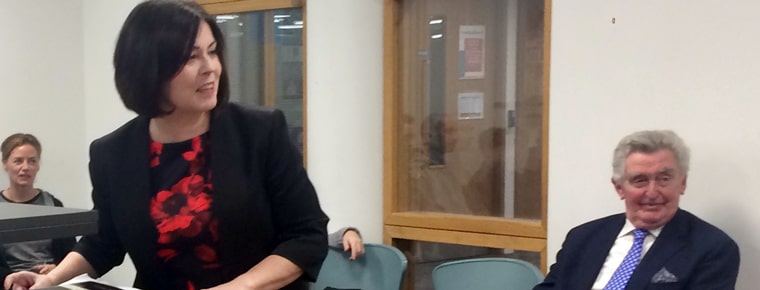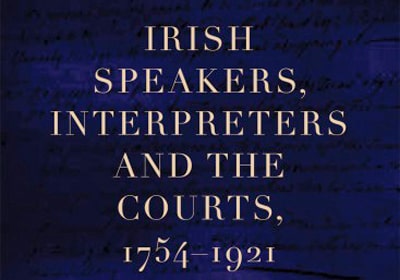 Justice Úna Ní Raifeartaigh flanked by Professor Dorothy Kenny and ex-Chief Justice Ronan Keane, at DCU
Justice Úna Ní Raifeartaigh flanked by Professor Dorothy Kenny and ex-Chief Justice Ronan Keane, at DCU
Courts disrespect native Irish speakers, says judge
State indifference to the Irish language may have contributed to a kind of ‘lingua-cide’, which has done untold damage to this country’s soul, a Court of Appeal judge has said.
Irish-speaker Ms Justice Úna Ní Raifeartaigh of the Court of Appeal said that, even today, when hearing cases through Irish, she is often met with responses ranging from indifference to outright hostility.
Some believe that Irish speakers are simply wasting court resources and time and attempting to dodge conviction, the judge remarked.

Launching Dr Mary Phelan’s Irish Speakers, Interpreters and the Courts 1754-1921 (Four Courts Press, 2019) at DCU’s O’Reilly Library on 21 January, Justice Ní Raifeartaigh said that even in the current day, Irish speakers are often treated less well than immigrants up before the Irish court system and needing translation services.
Attitude
“You pick up this attitude, even today … a greater tolerance of those foreigners, if you like, who use non-English languages, as long as they’re not Irish.
"So, if they’re Polish or they’re Latvian … they might get greater respect.
“Issues of translation and interpretation loom very large in the kinds of cases that are brought in the Irish courts today,” Justice Ní Raifeartaigh said.
Distrust
Historically, there has been distrust of those using the Irish language, said Justice Ní Raifeartaigh, so Dr Phelan’s historical themes resonate today, in a very interesting way.
The quality of translation on offer currently in Irish courts is “patchy” the Court of Appeal judge said, recounting that a bi-lingual barrister colleague had walked out of a case in disgust, such was the terrible quality of the translation on offer.
“I have to say, I do worry about my own experience on interpretation and translation,” Justice Ní Raifeartaigh said.
“I would see, in my own experience of practice, and as a judge, imperfections in the translation process.”
Injustices
Justice Úna Ní Raifeartaigh said we simply don’t know about the various injustices that may have taken place historically.
Dr Phelan’s book refers to a 19th century trial judge who said that the presence of an interpreter gave the witness an opportunity to prepare his answers, and thus evade cross-examination and gain an unfair advantage.
Bilingual judges
Justice Ní Raifeartaigh pointed to the usefulness of bilingual judges, with an understanding of both Irish and English, and who are ‘alive’ to an imperfect translation.
She said she came from a family that was steeped in the Irish language and, in relation to Dr Phelan's book, quoted Patrick Pearse – “Tír gan teanga, tír gan anam”.
Soul
“If the Irish language was a part of this country’s soul, it seems to me that this book sheds light on the difficulties endured by that soul, in one of the most important sites where State power is experienced by individuals, namely in the administration of justice or in the courts,” Justice Ní Raifeartaigh said.
Dr Phelan does that by examining, in a particular historical period (1754-1921), the provision of interpreters and the experience of those interpreters in that relevant period, she said.
Window
That in turn provides a window into views on the Irish language at the time.
“A great deal of time, effort and determination are required to change the language of a country,” Justice Ní Raifeartaigh quoted from the book’s introduction, “and it took centuries to change the language of Ireland from predominantly Irish to predominantly English.”
Justice Ní Raifeartaigh said this was a startling and evocative opening line, and she questioned whether the decline of Irish is entirely due to neglect and socio-economic factors, or whether the state actively pursued a policy of ‘lingua-cide’ in the 18th and 19th centuries.
State's apparatus
The courts were an essential part of the State’s apparatus, and the attitude to Irish speakers impacted on the quality of justice.
Dr Phelan’s book examines how interpreters were selected and paid, and the external positions from which they were chosen – including RIC men, farmers, auctioneers and publicans, as well as teachers, bailiffs, lawyers and jailers.
Hanged
Members of the RIC acted as interpreters in cases they had investigated, such as in the Maamtrasna murders, for which Myles Joyce was hanged in December 1882 on the basis of a statement later retracted, and despite not understanding a single word of the proceedings against him.
Joyce was asked by the interpreter the question ‘an dtuigin tú?’ at the start of the trial, to which he answered ‘tuigim’ [meaning he understood the question, but not that he understood the English language].
The interpreter was asking him if he understood the evidence being given in English, which he didn't.
The whole case proceeded in English with an RIC constable, Thomas Evans, giving evidence against the accused, while also providing the translation.
“To modern ears, the conflict of interest is completely unacceptable,” said Justice Ní Raifeartaigh, describing it as a tragic case in which an innocent man was hanged.
Myles Joyce was granted a posthumous pardon in 2018.
Liberator
Dr Phelan’s book also refers to the Liberator Daniel O’Connell, who was a fluent Irish speaker having been fostered to an Irish-speaking tenant family as a child.
As a barrister, he later remarked that the problem with interpreters of his time was that they spoke neither Irish nor English.
O’Connell cross-examined a witness charged with conspiracy to forge a will who said repeatedly in the witness box ‘bhí beatha ann’ when the will was signed.
Eventually, O’Connell got the man to admit that there was a living fly in the mouth of the deceased person, which was why he kept repeating the phrase ‘bhí beatha ann.’
Miscommunication
Justice Ní Raifeartaigh said that the quality of translation must have been a frequent cause of misunderstanding and miscommunication.
“There was constant pressure on witnesses to speak English, rather than avail of interpreters,” she said, and this led many to feel excluded from justice, particularly if they were monoglots.
Justice Ní Raifeartaigh said it was both interesting and a little sad that, as the legal and constitutional status of Irish has strengthened, the number of monolingual natives had declined to near-extinction.
She said the right to have a case heard in Irish was not so much a matter of due process but a matter of language rights.
Gave up on justice
“We will never know how many Irish speakers gave up on seeking justice because they knew that they might not be allocated an interpreter, or that once they had been sworn in, they could be challenged about their knowledge of English,” she said.
Professor Dorothy Kenny from the DCU School of Applied Language and Intercultural Studies welcomed attendees to Tuesday night’s launch.
The inter-disciplinary and ground-breaking nature of the research was spoken about by Professor Patrick Geoghegan, president of the Irish Legal History Society.
Work of scholarship
He said that the book was a major work of scholarship and a new departure for the society.
Dr Mary Phelan is a lecturer in the School of Applied Language and Intercultural Studies (SALIS) at DCU and teaches Spanish-English general and scientific/technical translation. She is chair of the Irish Translators’ and Interpreters’ Association.
Former Chief Justice Ronan Keane, Séamus Ó Tuathail SC and many other barristers and solicitors were in attendance.
Law lecturers, including Dr Niamh Howlin and Dr Thomas Mohr, both from the Sutherland School of Law at UCD, were there along with many of Dr Mary Phelan’s DCU colleagues.
Dr Mary Phelan’s Irish Speakers, Interpreters and the Courts 1754-1921 (Four Courts Press, 2019) is on sale now in a hardback 286-page Illustrated edition, priced €55.
Gazette Desk
Gazette.ie is the daily legal news site of the Law Society of Ireland